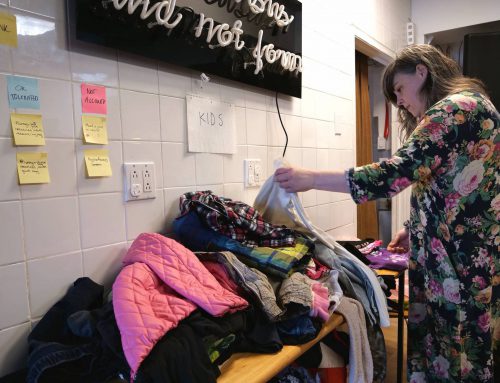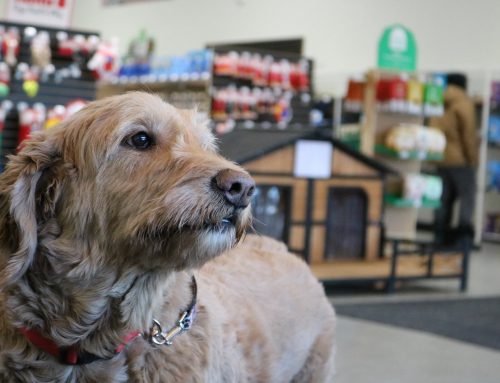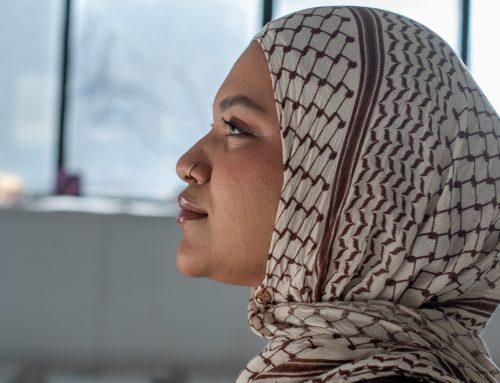BY Kieu-Lan Lê & William Cockerell
You might never guess that there are clandestine chicken keepers in Montreal.
But there are.
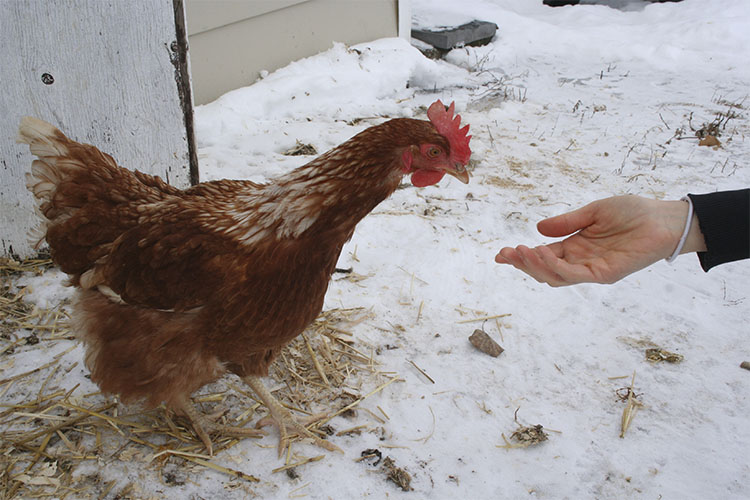
Urban chickens owners in Montreal are often illegally raising them because the majority of the boroughs in Montreal have not legalized chickens as pets. Photo by Kieu-Lan Le.
Louise Arbour is the founder of Poules En Ville, a group that teaches people how to raise chickens in the city. She has even created a 300-page document detailing everything from what chicken to buy to coop maintenance.
“I hope that the city of Montreal will take and read my document one day and will make firm and regulated laws instead of having citizens living with chicken unlawfully, and create a cohabitation instead of people fearing their chicken to be taken away from them,” says Arbour.
Despite an urban chicken pilot project in Montreal in 2016, it’s still illegal to house the birds in most boroughs. Arbour says that means many owners are forced to keep their chickens hidden from city inspectors.
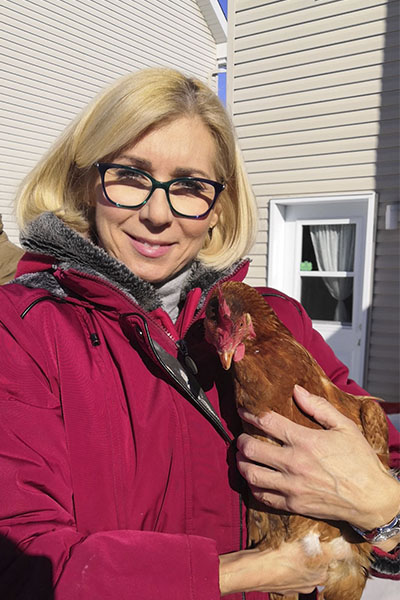
Founder of Poules en Ville, Louise Arbour, is a longtime advocate for urban chickens and has participated in the legalization of these birds in several cities in Quebec. Photo by Kieu-Lan Le.
Cities such as Terrebonne, Gatineau, Quebec, and most recently Longueuil all had pilot projects of their own. But they followed up by creating a framework of rules and authorizing chickens on residential properties.
Things haven’t gone nearly so smoothly in Montreal.
The 2016 pilot project was supported by a group called Poc Poc. They supplied coops that could be used year-round and promoted the idea of raising chickens on social media. The project launched in Rosemont–La-Petite-Patrie and Hochelaga-Maisonneuve.
But Poc Poc shut down in the summer of 2019, leaving the people left in the pilot project on their own.
Without proper aid and supervision, many chickens ended up abandoned at the SPCA. It turns out they are a lot more work than many people expected.
Before purchasing chickens, it is important to know how much time and effort goes into raising them. The City spoke to experts about proper chicken care. Video by William Cockerell.
There was not a lot of positive feedback in the final report of the pilot project. As a result, support for urban chickens dropped off, leaving it illegal in most boroughs.
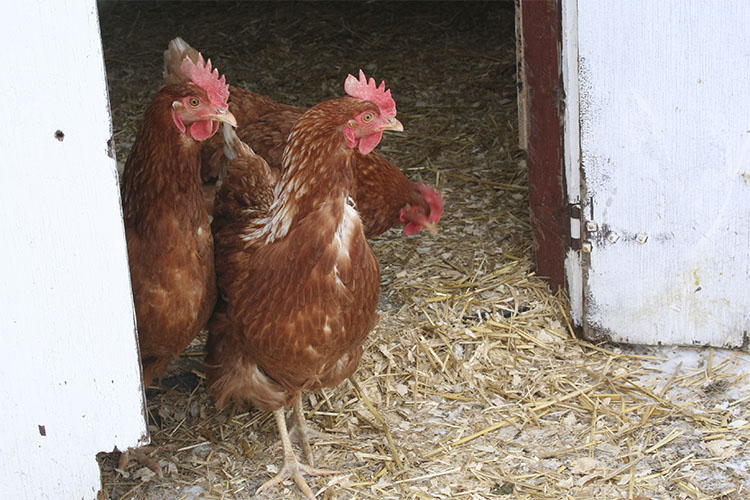
Chicken wire is supposedly a bad material to use to protect your chicken coop. It is fragile and easy to pull down, which means predators could simply tear it and attack the birds. Photo by Kieu-Lan Le.
Despite the Montreal experience, Arbour insists that the trend of raising urban chicken is still alive and growing.
“Even though it is illegal in most of Montreal, there is an existence of this ‘illegal’ chicken community,” she says. According to Arbour, even some gardening stores sell chicken food because they know part of their clients own illegal birds.
A list of all the cities that have legalized and legislated urban chickens, compiled by Louise Arbour from Poules en Ville. In blue are all the cities outside of Montreal, and in red is the sole borough that has allowed citizens to have chickens in their backyard. In yellow is the borough in Montreal that participated in the pilot project of urban chickens in 2016. Map by Kieu-Lan Le.
With no official guidelines on raising the birds, some people simply aren’t properly prepared to raise the birds.
“Having urban chickens involves constraints, and if you give them small, unsuitable, insulated coops, your birds will suffer,” says Arbour.
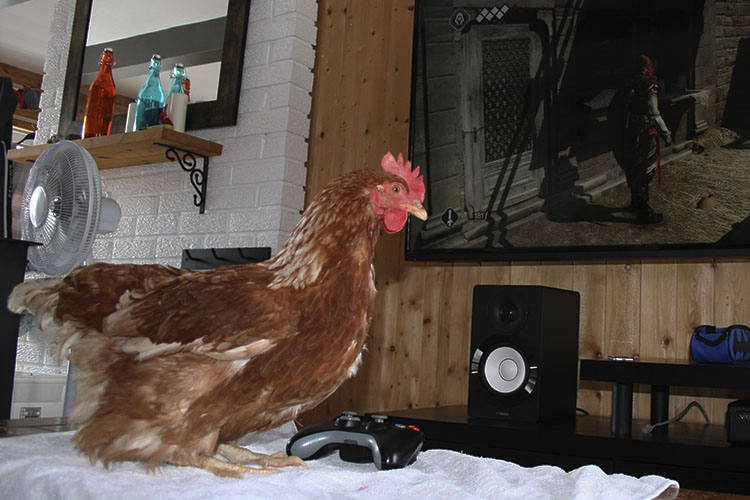
Louise Arbour highly suggests for first-time owners hybrids for their adaptation skills and their frequent egg lays. (Photo by Kieu-Lan Le)
Martine Boulianne, a veterinary professor at the Université de Montreal who specializes in poultry farming, agrees that it is important to be well informed on animal well-being before getting any birds.
“Most people do not know about ‘The Five Freedoms’ in animal welfare, and this could change their perspective in deciding to raise or not these farm birds,” says Boulianne.
The Five Freedoms are a core concept in animal welfare that states that an animal’s primary welfare needs can be met by safeguarding the following five freedoms: Freedom from hunger and thirst, freedom from discomfort by having a proper shelter, freedom from pain, injury or disease, freedom to express normal behaviour, and finally, freedom from fear and distress.
Both Arbour and Boulianne agree that future owners of chickens should buy their livestock at a certified agricultural store.
“They’re the only ones that truly assure hens in good health since they come from hatcheries who have the obligation to vaccinate them,” says Arbour.
Boulianne adds that proper teachings on how to raise chickens can make it a rewarding experience, especially with children.
“If you get children who are a bit more connected with food production and animals, chickens are a good pet to have in the household,” says Boulianne. “They will teach noble responsibilities to them, and it will teach them that their food does not just come from the store. They see the source of it, in their backyard.”

To show the chickens where to lay their eggs, Arbour puts a fake egg at the back of the lay box. Usually, a hybrid hen usually lays one egg per day over two years. Photo by Kieu-Lan Le.


